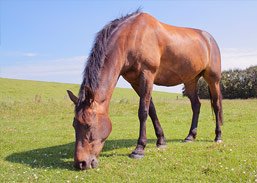Abscesses occur when an animal gets a small wound and bacteria gets inside. Small wounds heal over very quickly, but the trapped bacteria grows and forms a pocket of puss. Puncture wounds from fences, farm equipment and animal bites are a very common cause of abscesses, because the small puncture is an easy delivery for bacteria and the opening is very small so it closes up quickly. They can occur on any part of the body, but horses commonly get abscesses in their hooves when a small particle of sand gets lodged up in the hoof wall. If the dirt and bacteria work their way up into the sensitive tissues in the foot an abscess can form causing acute lameness.
You can recognize if your horse has an abscess because they are painful lumps that develop very quickly and are soft to the touch. Hoof abscesses are similar in that the horse’s hoof will be very sensitive, warm to the touch and the horse quickly becomes very lame. Front feet tend to get abscesses more often than the hind because horses carry more weight on the front end. Since abscesses are infections, your horse may develop a fever and not feel very well.
If your horse gets an abscess, it is important to call the vet very quickly so that it can be treated before it gets too big. If abscesses are left untreated they will grow (and get very large) until they burst either breaking the skin or into the body which can infect the blood or other tissues. Small abscesses can be treated with antibiotics, but large ones need surgical intervention. The vet will lance the abscess to release the pressure then flush out the puss and put in a drain to keep the wound open long enough for all of the infection to drain out. Horse owners need to put hot compresses on the area to keep it clean and help it drain.
Hoof abscesses sometimes burst on their own, but again it is best to have the vet or farrier open it up to drain. Soaking the horse’s hoof in warm water with Epsom salts cleans the infected area, then the hoof should be wrapped with a poultice and duct tape (or a hoof boot) to keep it from becoming re-infected. Fortunately abscesses are relatively easy to treat and horses recover quickly. Good hoof care and regular cleaning will help prevent hoof abscesses from occurring.
Studies
Successful medical management of intra-abdominal abscesses in 4 adult horses.
Submandibular lymph node abscess caused by actinomyces denticolens in a horse in Ontario.
Dysuria and stranguria associated with colonic ulceration and abdominal abscess in a horse.


